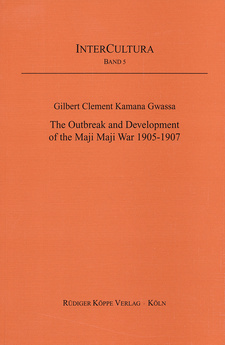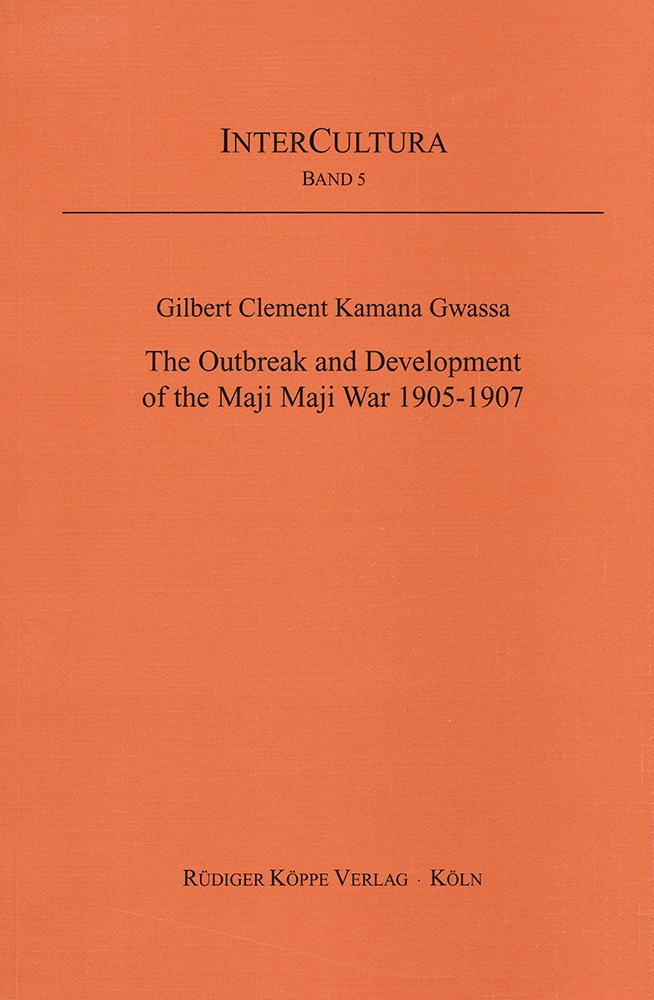The Outbreak and Development of the Maji Maji War 1905-1907, by Gilbert Clement Kamana Gwassa.

The Outbreak and Development of the Maji Maji War 1905-1907, by Gilbert Clement Kamana Gwassa. InterCultura. Missions- und kulturgeschichtliche Forschungen Band 5. Rüdiger Köppe Verlag. Köln, 2005. ISBN 3896454463 / ISBN 3-89645-446-3
In the time of preparing actions in connection with the anniversary of the Maji Maji War in the former colony "German-East-Africa" the editor encountered the doctoral thesis The Outbreak and Development of the Maji Maji War 1905-1907, by Gilbert Clement Kamana Gwassa.
Wars of resistance against colonial rule in Africa cannot be viewed as an isolated and unique experience of the resistors. The mode of resistance and the strategy of violence was very much shaped by their previous historical experiences. Since the fifteenth century East African societies had been experiencing series of external impacts including the introduction of new forms of worship such as Islam and Christianity. Eventually, the Oman Arabs and other Asians established themselves in Zanzibar and on coastal centres leading to the growth of the so-called Swahili culture in those areas. The resulting increase in long distance trade and slave trade had far reaching effects on the African societies. Kilwa and its hinterland was one of the most important bases of these developments on the mainland coast. On the other hand African societies themselves were undergoing internal transformations and adjustments as a result of wars, migrations, trading and natural population increase or decrease as the case might be. These changes had important cultural implications particularly in connection with social values, norms and standards of the people as a whole. At the same time, however, the growing technological gap and consequent economic dependency on the international capitalist system was increasingly being emphasised. These processes did not operate equally or in the same way and form everywhere. But they must be seen as important indicators of how a given society in East Africa could react against specific colonial pressures. Thus, although the Maji Maji societies had to evolve a new ideology to unite the various ethnic groups against a technologically superior foe such innovation had to be based on those ides, beliefs and socio-historical experiences extant amongst those people. In other words, when the crisis of colonial exploitation and oppression made violence a necessity the people of Southern Tanzania possessed cultural potentialities which made such an innovation possible. Similarly, although the military scale had to be enlarged and systematised on a supra-ethnic level, once the war broke out it drew heavily on the resources of traditional methods of warfare of the various ethnic groups. The African use of traditional guerilla methods alarmed the German forces as their dependency on mercenaries and on a policy of total extermination became a dominant feature. If previous experiences, beliefs and ideas were important, the people's techniques of liberation were subsequently conditioned by their experiences and outcome of these mass wars. The Maji Maji peoples had suffered a lot. Violence as a technique of liberation was thereafter suspected. Indeed examples elsewhere in Africa do not suggest a return to mass violence once the first attempt has been suppressed. Traditional methods of warfare became a less consequence as the mercenary principle became consolidated by the colonial system. The Maji Maji war created several problems. Firstly, there was acute depopulation of Southern Tanzania. Secondly, a considerable generation gap was created and the birth rate was reduced, probably by 25%. As a result, the peasant economies of the people were distorted and weakened for a long time. The situation was aggravated by the effects of the First World War and labour migration in some of the Maji Maji areas. Clearly then, the Maji Maji war affected the subsequent history of Southern Tanzania in particular and of the country as a whole. [...]
This is an excerpt from The Outbreak and Development of the Maji Maji War 1905-1907, by Gilbert Clement Kamana Gwassa.
Title: The Outbreak and Development of the Maji Maji War 1905-1907
Author: Gilbert Clement Kamana Gwassa
Editor: Wolfgang Apelt
Series: InterCultura. Missions- und kulturgeschichtliche Forschungen Band 5
Publisher: Rüdiger Köppe Verlag
Köln, 2005
ISBN 3896454463 / ISBN 3-89645-446-3
Softcover, 16 x 24 cm, 330 pages, 2 maps
Gwassa, Gilbert Clement Kamana im Namibiana-Buchangebot
The Outbreak and Development of the Maji Maji War 1905-1907
The Outbreak and Development of the Maji Maji War 1905-1907 is a doctoral thesis, accepted 1973 at the University of Dar es Salaam.

